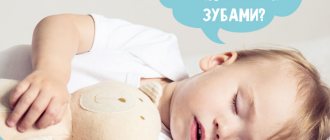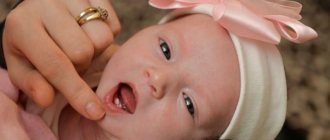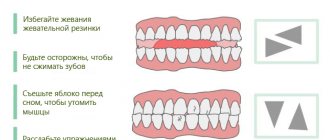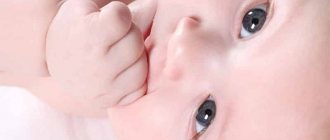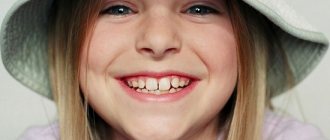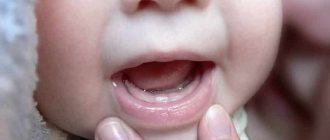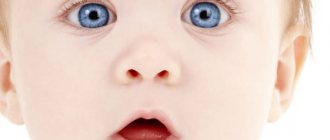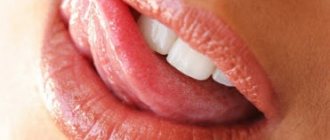General description of the phenomenon
Half of children under 5 years of age involuntarily grind their teeth due to a spasm of the chewing muscles. Teeth grinding occurs involuntarily, occurs in paroxysms, lasts 1-2 minutes, and then repeats. The characteristic sound of teeth rubbing against each other can be heard from the nursery several times a night.
Attacks do not depend on the time of day and can occur during periods of rest and wakefulness. The child grinds his teeth day and night, but daytime grinding bothers adults more than nighttime grinding. Daytime grinding attacks are called bruxomania. Parents turn to the pediatrician when an episodic phenomenon develops into a chronic disorder.
Bruxism in children can be caused by dental, neurological and psychological reasons. In order for a child to stop grinding his teeth, the causes must be eliminated. Installing them is not so easy: you will need to undergo examination by a dentist, neurologist, endocrinologist and psychologist.
Teeth grinding is more common in young children. After 6-7 years it ceases to be a problem and disappears on its own. Bruxism is a rare phenomenon in adolescence and older age, which is diagnosed in only 10-15% of patients.
It is impossible to ignore teeth grinding in a child - it negatively affects the teeth, jaw and joints . Because of it, children:
- tooth enamel wears off;
- teeth become loose;
- the bite is disturbed;
- teeth become sensitive to hot, cold, sour and bitter foods;
- the temporomandibular joint is overloaded;
- spasms of the masticatory muscles occur;
- involuntary spasms of the facial muscles occur, distorting the contour of the face.
Malocclusion leads to wear and then loss of teeth in youth, dislocation of the temporomandibular joint and facial asymmetry.
Teeth grinding is not considered a separate disease. This is a symptom caused by a disorder in the development of the dental system, parasitic diseases, and nervous strain. When making a diagnosis, the doctor assesses the general state of health, taking into account systemic, neurological and somatic symptoms.
Having heard the characteristic sound of grinding, parents need to carefully monitor the child and notice anything new in his behavior. In parallel with bruxism, other symptoms appear, which will make it easier to determine its causes. Tell your pediatrician if your baby has any complaints about your health that indicate fatigue or the development of a disease in the digestive, endocrine, or nervous systems.
Prevention of Burxism
Prevention of teeth grinding in children includes a set of measures to reduce stress, fatigue and overexertion. A calm, friendly atmosphere in the family, good nutrition, proper daily routine and quality sleep are very important here.
For this, doctors recommend:
- provide the baby with a balanced diet and a sufficient period of breastfeeding;
- Never give food containing harmful preservatives or flavorings;
- Gradually introduce more solid foods into your diet to activate your chewing muscles;
- do not play active games or watch TV before bedtime;
- respond to crying and other signals given by the baby;
- sing songs, talk, calm - the child should always feel comfortable and cozy.
10 Month old baby grinds his teeth.
Why does my child grind his teeth at night?
In a dream, a child grinds his teeth for various reasons.
Nervous overstrain
If the cause is nervous tension, check for the following signs:
- rapid breathing;
- rapid pulse;
- active swallowing of saliva;
- smacking;
- slurping;
- talking out loud while sleeping.
All this indicates overexcitation during the day. Emotionally active children and vulnerable kids who take everything to heart are more susceptible to stress than others. The former cannot sit still and waste a lot of energy, while the latter are sensitive to every little thing, which is why they experience more stress than their peers. Causes for concern may be:
- adaptation to a new team;
- changing of the living place;
- tense parental relationships;
- unfavorable family environment.
Stress accumulates during the day, and if the baby restrains or suppresses emotions, then when he relaxes at night, he cannot control the body.
Find out how to help your child adapt smoothly to school or kindergarten.
Active children do not experience stress caused by external circumstances, but independently bring themselves to nervous overstrain.
Problems with teeth, bite
Night grinding can occur due to dental problems:
- teeth are positioned incorrectly;
- the upper row of teeth does not meet the lower one;
- the filling sticks out above the dentition line.
Enlarged adenoids
If a child grinds his teeth in his sleep and at the same time sniffles, breathes with difficulty through his nose or breathes with an open mouth, it is necessary to exclude enlarged adenoids. In this case, you will need to consult a pediatrician and otolaryngologist.
Other reasons – Dr. Komarovsky’s opinion on teeth grinding
Dr. Komarovsky gives various reasons for bruxism:
- sensitivity of the child's psyche. Children perceive current events differently than adults, experiencing excessive emotional stress. If a child grinds his teeth in his sleep, he shows that he experienced stress during the day;
- tooth growth. Children grind their jaws when teething and replacing baby teeth with molars;
- diseases of the temporomandibular joint and malocclusion. Pathology of the dental system disrupts sleep by grinding teeth;
- heredity. Studies confirm that 3-year-old children are 51.3% more likely to bruxism if one of their parents suffered from it;
- bad dream. Teeth grinding occurs if sleep is disturbed by nightmares, speaking out loud, or sleepwalking;
- breathing disorders. Adenoids, runny nose, and nasal congestion prevent the child from breathing normally. Breathing with your mouth slightly open can cause creaking;
- vitamin deficiency. Disturbances in the functioning of the nervous system and contractions of the facial muscles can be caused by a lack of B vitamins, magnesium, calcium and essential amino acids;
- there is no adequate load on the jaws. A child’s diet, which contains little solid food, does not help form the jaw apparatus.
Older people blame helminths for teeth grinding. Soviet-era grandmothers cite the presence of helminthic infestation as the main reason why a child grinds his teeth in his sleep. Both healthy children and children who have been diagnosed with worms grind their teeth. The connection between the parasitic disease - helminthiasis - and night grinding is not scientifically substantiated.
Take care of the health and safety of your child, even when you are not around! Find out how he is feeling in kindergarten or primary school, quickly contact if necessary and listen to what is happening around with the help of the #1 app for caring parents “Where are my children”.
Prevalence in children
Childhood bruxism is a common phenomenon. Typically, seizures in children do not last long, up to 10 seconds, and are short-lived. If a child grinds his teeth heavily during sleep, the duration of the attack and its frequency should be monitored.
Prolonged and intense attacks lead to damage to the jaw and facial muscles, abrasion and fractures of teeth.
After a restless night, children may experience headaches, toothache and sensitivity of the soft tissues of the face may occur due to damage to the enamel.
Photo: Tooth wear during bruxism
Attacks of creaking in children that last for months need to be investigated and the cause of their occurrence must be sought.
Bruxomania - teeth grinding while awake
Young children under 3 years of age may grind their teeth during the day if they are teething. So, by squeezing and unclenching their jaws, they try to get rid of the unpleasant sensation in the gums.
Involuntary grinding can also occur due to the fact that the lower row of teeth protrudes more forward or the upper row of teeth hangs excessively over the lower one. If, when closing the jaw, gaps are visible between the teeth, the baby is grinding due to an incorrectly formed bite.
Correct bite is not the norm, but rather the exception. 10% of the adult population can boast of a beautiful smile, while for everyone else, problems with the dental system develop in childhood.
Children over 3 years of age who do not have bite problems suffer from bruxomania if they have an extremely excitable nervous system or a stressful environment.
Causes of Bruxism
First of all, it is necessary to put aside false reasons. The famous children's doctor E. O. Komarovsky believes that bruxism itself does not pose any danger to the child’s health and does not indicate any serious problems. Komarovsky believes that there is no scientific or medical reason to believe that teeth grinding indicates the presence of worms in a child.
Although for some reason this statement is at the top of the possible causes of bruxism. E. O. Komarovsky says that he himself does not understand where such a superstition came from, but completely different symptoms signal worms. It is impossible to ignore the daily grinding noise. Dr. Komarovsky warns that prolonged bruxism can lead to dental diseases.
If we talk about the true reasons for this deviation, then first of all we need to remember about teething. By 10 months to 1 year, children already have their first teeth. For them, this condition is new and incomprehensible, so with such friction they are simply trying to study the teeth and get used to them. Also, when teething, babies experience pain and itching. This is another cause of bruxism.
In children older than one year, a permanent bite is already beginning to form. If there is a violation of the closure of the upper and lower jaws, night grinding of teeth appears, which can also manifest itself during the day. An experienced dentist will help confirm or refute such a guess. Heredity plays an important role in this situation. If one of the parents in childhood had the habit of grinding their teeth, then it is possible that the child will also have such a desire.
Why are active and emotional children more likely to suffer from bruxism? Sometimes an involuntary grinding sound appears during a period of nervous overstrain. A child may be affected by a small quarrel with peers on the playground, moralizing by parents about a broken vase, or an unpurchased toy. It should also be noted that daytime bruxism is an age-related phenomenon. Most often, children begin to grind their teeth at 2-3 years of age. By the age of 6, this habit disappears in most cases. As a rule, bruxism accompanies boys.
What does childhood bruxism mean at different ages?
Teeth grinding may be a concomitant phenomenon associated with physiological changes in the body. Before running to the doctor, rule out age-related developmental features.
7-8 months
Grinding in infants may occur if they are weaned from breastfeeding or have had an emotionally charged day. At the same time, they begin to be capricious, cry, refuse to eat, disrupting their feeding and sleep patterns. To avoid a “scary” sound, the baby should be in the most comfortable environment possible. Weaning may be causing stress, so hold off on making feeding changes until later.
9-10 months
At this time, baby teeth begin to cut, which is why the baby’s gums swell, body temperature rises and behavior changes. The child cries more and puts all objects in his mouth. In this case, the grinding is a symptom that will go away after some time. To make your child feel better, give painkillers, anti-inflammatory medications, and use cooling gels for the gums.
11-12 months
Children grind their teeth after weaning and due to vitamin deficiency caused by a deficiency of micro- and macroelements in the new feeding. During this period, they sleep poorly and lose their appetite.
If in addition to this, the child experiences pale skin, convulsions and lethargy, you should immediately consult a doctor.
1-2 years
After the first year of life, babies suffer from nasal breathing problems and various inflammations of the nasopharynx. These children are diagnosed with:
- adenoids;
- labored breathing;
- cough;
- rhinitis;
- sinusitis.
This age requires increased attention to health: prevent colds, strengthen the immune system and promptly treat diseases under the supervision of an otolaryngologist.
3-4 years
Children begin to socialize and communicate with peers in kindergarten. Adaptation in a team is complicated by the 3-year crisis, which manifests itself in the form of whims, hysterics, disobedience and non-compliance with the daily routine.
5-6 years
The creaking sound appears more often during the day than at night. Bruxism affects preschoolers who have problems with their bite or nervous system. It is accompanied by spasms of the facial muscles, incorrect positioning of the teeth, and complaints of pain from various organs. To avoid grinding, consult your dentist, pediatrician, and, if necessary, other doctors. Treat dental anomalies: you need to wear mouthguards, plates or other removable structures that correct the bite.
What is this phenomenon?
In medicine, night grinding is called bruxism - it is a contraction of the masticatory muscles, resulting in a strong clenching of the jaw and the appearance of a creaking sound. Convulsive compression lasts about 10 seconds, and it can be repeated more than once.
It has been noticed that when a child creaks, his breathing, blood pressure and pulse change. Moreover, boys are more susceptible to this phenomenon.
Bruxism with squeezing Bruxism with grinding
Bruxism occurs due to a number of reasons, which include:
- Genetic predisposition.
- Teething. Due to a physiological process, the baby develops itching, which he relieves in various ways. In this case, after the tooth appears above the gum, this phenomenon will pass.
- Malocclusion. Children try to grind their teeth together. In this case, it is necessary to consult a dentist to avoid problems with the dental apparatus.
- Jar of Hearts. Often a child squeaks due to stress. If this concerns the baby, then you should pay attention to the weaning period. Against the backdrop of sudden changes, the baby may experience dissatisfaction with the sucking instinct. As the grandmothers say, “I didn’t get pumped.”
- Older children are often tired and have a tremendous burden on them. A common cause in modern times is overwork.
- Adenoids. Bruxism often occurs against this background.
- Lack of vitamin B, calcium and magnesium.
- Onset of epilepsy.
About the need to treat bruxism
If teeth grinding disrupts sleep for several days, then it’s too early to sound the alarm. However, if the grinding episode becomes persistent, it is time to see a doctor. Parents need to find out why their child grinds his teeth if:
- the grinding is strong and leads to pain in the jaw and neck;
- the child continues to grind his teeth for 3 weeks or more;
- poor health, complaints about sleep and pain from any organ system;
- other symptoms appear.
Procedure for making a diagnosis:
- make an appointment with your local doctor;
- talk about changes that were noticed in the behavior and health of the baby;
- get examined by a dentist;
- as prescribed by the treating pediatrician, do polysomnography, consult with a neurologist, gastroenterologist, or otolaryngologist.
If you don't go to the hospital, you are putting your baby's health at risk. Untreated bruxism will lead to:
- chipped tooth;
- enamel microcracks;
- tooth abrasion;
- periodontitis;
- malocclusion;
- changes in jaw structure;
- dysfunction of the facial joints;
- headaches;
- neuralgia;
- spasms of the facial muscles;
- disruption of sleep and wakefulness;
- diseases of the nasopharynx.
During exacerbations of bruxism, nightmares and sleep disturbances alone will not be enough. Throughout his life, the child will face serious consequences after “childish” teeth grinding.
How is bruxism treated?
The course of treatment is selected after it is determined exactly why the child grinds his teeth. Depending on the reason, they may prescribe:
- consultations with a psychologist teaching how to independently relieve nervous tension;
- a course of psychotherapy to stabilize the emotional state;
- drug treatment against cramps of the facial and masticatory muscles, damage to the trigeminal nerve;
- therapeutic and preventive procedures for improving the health of the oral cavity;
- anthelmintic drugs.
At the same time, the pediatrician will recommend not to overexert yourself before bed, stick to a routine, get a balanced diet, take a complex of vitamins for children, and attend physical therapy to normalize nasal breathing.
How can you help your child?
If a child grinds his teeth at night, you need to pay attention to his emotional state. There may be a relationship between the creaking and his changes in life: he started going to kindergarten, the teacher changed, there was a change of residence. It would be a good idea to talk with caregivers or teachers to find out how children spend time away from home, what kind of relationships they have with children and adults.
Particular attention should be paid to the home environment; the child’s activities should be organized in such a way that he spends as little time as possible in front of the computer.
A visit to a neurologist is the first stage of treatment.
It is necessary to limit viewing of programs that negatively affect the child’s psyche. It’s better to read a book together in the evening, chat or listen to a calm melody.
In addition, reasonable physical activity for children is important to stabilize their mental state. It is necessary to create a daily routine in such a way that children spend enough time outside. If a child grinds his teeth, doctors advise putting him to bed 1 hour earlier, since it has been noted that this phenomenon is related to fatigue.
Protective mouthguards for teeth
Tips for parents
To have a restful sleep, instead of watching cartoons, outdoor activities and computer games, take a walk down the street in the evening. Before going to bed, a child can take a relaxing bath and listen to a good fairy tale that does not contain scary characters.
Contact your dentist even if there are no problems with your teeth, but bruxism is present. He will select a special mouth guard for night wear. It does not eliminate grinding, but protects teeth from abrasion.
Half of children grind their teeth, so there is no need to panic at a single grinding sound. You should be concerned about frequent squeaks.
To prevent a child from grinding his teeth, the cause must be found and eradicated. Make sure he avoids stressful situations, eats right and doesn't overwork himself.
General recommendations for the treatment of burxism
Treatment of Burxism is, first of all, eliminating the causes that caused it. Therefore, the process will always be individual. In some cases, such as malocclusion, the help of a dentist or surgeon will be required. In others, when grinding is a consequence of stress and other psychological factors, it is necessary to consult a neurologist. For breathing problems, runny nose, adenoids and sinusitis, the treatment will be completely different.
Here are some simple recommendations that can be applied generally or in individual cases.
To prevent the negative consequences of Burxism, dentists recommend:
- Use special devices during teething that will ease the child’s discomfort. They will also help in the more harmonious development of the jaw apparatus.
- Apply anesthetic gel to the gums.
- After feeding, wipe the gums with wet wipes after feeding and properly brush new teeth with a specialized paste. Asepta has developed products in the Baby, Kids and Teens series, which gently cleanse teeth and gums, strengthen enamel, and prevent the proliferation of pathogenic bacteria and the development of caries.
- For gum inflammation, rinse your mouth with herbal infusions.
- If your muscles are too tense, you should apply a warm compress or do a five-minute massage before going to bed.
In order not to have to treat the child, it is better to carry out preventive measures.
What to do if your child grinds his teeth?
- The first step is to make an appointment with a dentist and pediatric neurologist. The first will give practical recommendations on how to prevent enamel wear, the second will determine why the child has teeth grinding.
- Monitor the psychological microclimate in the family. The child should be honest about his worries and be sure that he will receive help from his parents.
- Adjust your daily routine. An hour before going to bed, the child should be occupied with a calm activity to avoid overstimulation of the nervous system.
- Balance the children's menu. The daily diet should include solid vegetables and fruits - the load on the masticatory muscles during wakefulness will lead to their relaxation during sleep.
- Teach self-control. In the form of a joint game, practice every day following the simple rule: “Lips are closed, teeth are apart.” This way, the baby will not form the bad habit of clenching his teeth during the day, even at the moment of strong excitement.
Diagnostics
As a rule, the diagnosis is made based on complaints from the child or his parents, who have repeatedly heard teeth grinding at night.
Objective methods for diagnosing bruxism:
- Brooks checkers. This is the name given to special mouthguards made from a cast of the child’s jaw. They allow you to determine the presence of occlusal obstacles. Brooks checker shows which teeth are under overload.
- Polysomnography allows you to determine how correctly the sleep processes are proceeding. To do this, special sensors are attached to the child to record changes in various systems and organs.
- Electromyography - helps to analyze the work of the masticatory muscles and find out whether there is serious overstrain.
- Electroencephalography - studies the electrical activity of a child's brain.
Diagnosing bruxism usually does not cause difficulties, while to determine the cause of its occurrence, it is often necessary to seek help from specialists such as a neurologist, psychologist, gastroenterologist, otolaryngologist and osteopath.
If you notice signs of bruxism, the first thing to do is monitor your baby's sleep. Pay attention to how long the attacks last, how often the creaking appears.
Notice how the child behaved the day before, whether there was any emotional or physical stress. It is important to observe whether the problem manifests itself during the day and whether the baby’s condition is disturbed.
Then parents should contact a specialist. To clarify the diagnosis, doctors recommend conducting a polysomnographic study. This diagnostic method allows you to record contractions of the jaw muscles that occur involuntarily. The method helps to distinguish bruxism from hidden pathologies and is indispensable for children at risk of developing epilepsy.
A dentist can also help diagnose bruxism. The doctor examines the baby’s oral cavity, determines the condition of the teeth and gums, and pays attention to the wear of the enamel.
In doubtful cases, the dentist recommends using a special brux checker. This is a mouth guard made of soft plastic or rubber; it is worn while the child sleeps. In the morning, the condition of the mouth guard is assessed; deformed areas indicate stress on the teeth in these places.
To make an accurate diagnosis and prescribe the correct treatment, the child should be consulted by related specialists. Such children are examined by a dentist, a neurologist, and a psychologist.
